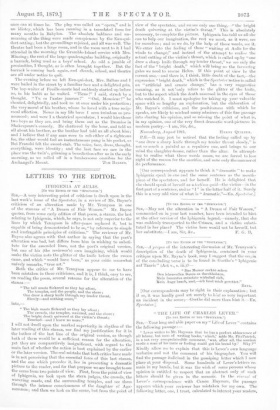LETTERS TO THE EDITOR.
IPHIGENIA AT ATJLIS. [To THE EDITOR OF THE " SPECTATOR."]
Sin,—A very interesting point of criticism is dwelt upon in the last week's issue of the Spectator, in a review of Mr. Bayne's
criticism of an alteration made by: Mr. Tennyson in one of the stanzas of "A Dream of Fair Women." Mr. Bayne quotes, from some early edition of that poem, a stanza, the last relating to Iphigenia, which, he says, is not only superior to the lines by which Tennyson in after-years replaced it, but is capable of being demonstrated to be so," by reference to simple and irrefragable principles of criticism." The reviewer of Mr. Bayne also agrees with that author in saying that the poet's alteration was bad, but differs from him in wishing to substi- tute for the amended lines, not the poet's original version, but one of his (the reviewer's) own imagining, which would, make the victim note the glitter of the knife before the swoon came, and which "would have been," as your critic somewhat naïvely remarks, "true art."
Both the critics of Mr. Tennyson appear to me to have been mistaken in these criticisms, and it is, I think, easy to see, on reading the poem, several reasons for the alteration of the stanza :—
" The tall masts flickered as they lay afloat, The temples, and the people, and the shore ; One drew a sharp knife through my tender throat, Slowly—and nothing more," into,-
" The high masts flickered as they lay afloat;
The crowds, the temples, wavered, and the shore ; The bright death quivered at the victim's throat ; Touched—and I knew no more."
I will not dwell upon the marked superiority in rhythm of the later reading of this stanza, nor find my justification for it in the bathos of the last line of the original version, as though both of them would be a sufficient reason for the alteration, yet they are comparatively insignificant, with regard to the main fact of whether the action is best explained by the earlier or the later version. The real mistake that both critics have made is in not perceiving that the essential force of this last stanza, and the one which precedes it, lies in presenting a dramatic picture to the reader, and for that purpose we are brought to see the scene from two points of view. First, from the-point of view of Iphigenia, we look upon the stern judges, the crowds, the wavering masts, and the surrounding temples, and see them through the intense consciousness of the daughter of Aga- memnon; and then we look on the scene, but from the point of
view of the spectator, and we see only one thing,—" the bright death quivering at the victim's throat.' This is absolutely necessary, to complete the picture. Iphigenia has told us all she can to help our imagination, the rest we. must, as it were, see for ourselves ; and so we do, by the help of those words, see it. We enter into the feeling of those " waiting at Anlis for the winds to change," and instead of the attempt- to realise the actual cutting of the victim's throat, which is called up by "one drew a sharp knife through my tender throat," we see only the fact of the " bright death," which will bring us the favouring gales we need to rescue Helen. If this point of view be the correct one,--and there is, I think, little doubt of the fact,—the expression "bright death," which in the Spectator notice is called an " artificial and ornate change," has a very suggestive meaning, as it not 'only refers to the glitter of the knife, but to the aspect which the death assumed in the eyes of those who watched it. I must apologise for taking up your valuable space with so lengthy au explanation, but the elaboration of Mr. Bayne's criticism, and the positiveness with which he speaks, are likely to mislead many admirers of this fine passage into sharing his opinion, and so missing the point of what is, iu my opinion, one of the very finest dramatic word-pictures in modern poetry.—I am, Sir, &c., Nuremberg, August 19th. HA RAY QUILTElt.
P.S.—It may just be noticed that the feeling called up by "one drew a sharp knife through my tender throat slowly," is not so much a painful as a repulsive one, and brings to our mind the slaughter-house, rather than the altar. In attempt- ing to realise what these words mean, we are forced to lose sight of the reason for the sacrifice, and note only the manner of its performance.
[Our correspondent appears to think it "dramatic " to make Iphigenia speak in one and the same sentence as the mouth- piece of the spectators, and for herself. Ho is delighted that she should speak of herself as a ter, i /CIIL quid--the victim—in the first part of a sentence, and as "1" in the latter half of it. Surely this is a very odd view of what is " dramatic."—En. Spectator.]






























 Previous page
Previous page